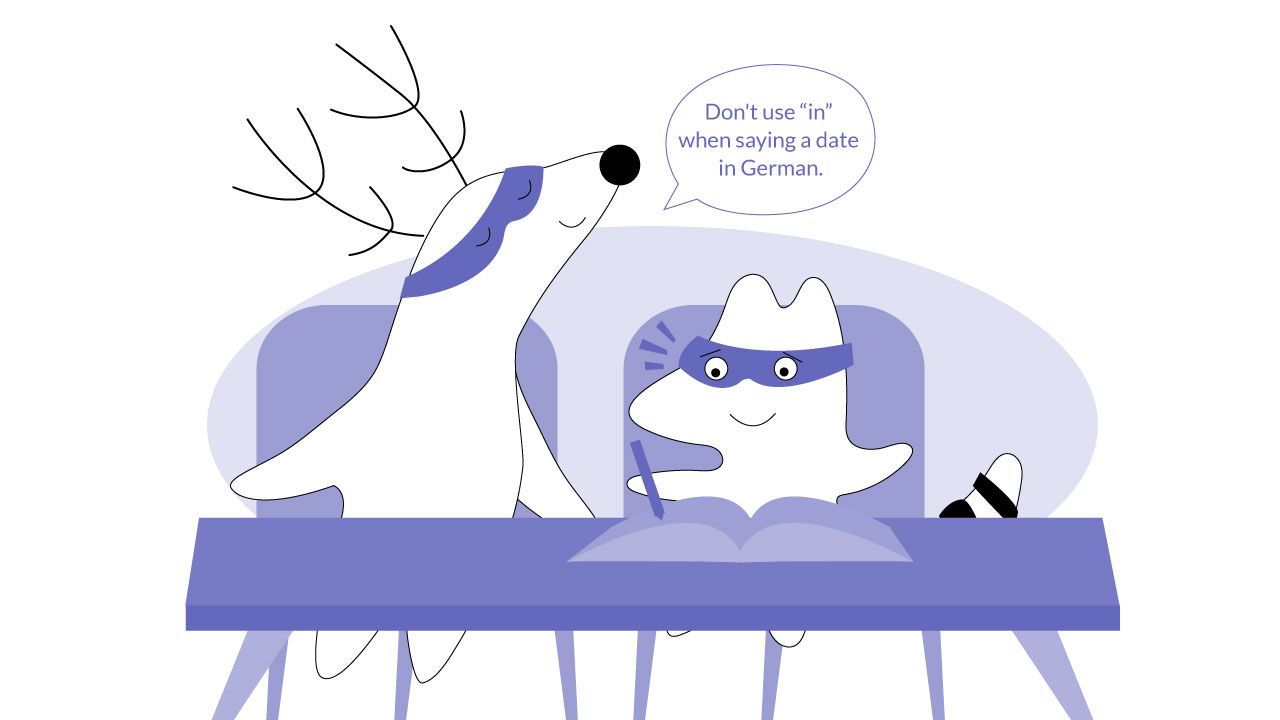
Poor German writing skills can be caused by many reasons related to different areas of your language knowledge. This could be anything from grammar and spelling mistakes to a small vocabulary to simply a lack of practice. Fortunately, there are several simple steps you can take to fill these gaps and ensure that your German writing gets better and better over time.
In the article below, you'll find a quick guide with straightforward tips for improving your writing skills in the German language. Use these regularly and consistently, and you'll be able to see progress in no time.
Learn German with Langster
Read and Read and Read
The first and main step to improving your German writing skills is reading in German as much as possible. Not only will this broaden your vocabulary, but it will also help you get used to German spelling, which can be really challenging sometimes.
After all, learning the German alphabet is the first thing every learner does, but seeing how different letters and words can be combined takes them to a whole other level. And regular reading practice is essential for that.
To get the most out of your reading, focus on reading texts that are at or slightly above your current level of fluency. This will challenge you but also allow you to make progress relatively quickly.
In addition, it's important to read a variety of different types of texts. If you only read novels, for example, you'll miss out on essential practice with other genres such as newspapers, essays, academic texts, or even web articles.
Try to mix things up as much as possible so that you can improve your overall writing skills. This will give you exposure to a wide variety of language styles and grammar structures in written German. This, in turn, will help you to become more comfortable with writing.

Find a Pen Pal or Chat in German
Finding a pen pal can be a great way to get regular writing practice. Writing letters in German to someone and then receiving a reply in return is an excellent way to improve your vocabulary, spelling, and grammar. It can also help you to become more comfortable writing in a variety of different contexts and styles.
If you don't know anyone who can be your pen pal, there are plenty of language exchange websites where you can find someone who is interested in learning your native language and knows German. This can be a great way to get started, as both of you can help each other out with your language skills.
Another option is to chat with someone in German online – this will be perfect if you don't like writing physical German letters. You can check out Facebook groups or the websites of German schools, which can help you get in touch with interested people.
Messaging online is a great way to get used to casual modern German and German slang. You also get a chance to see how differently native speakers use the language as opposed to the standard German you’re learning.
The main benefit of this approach is that not only do you practice regularly and talk to real people, but you also get feedback from them. Your pen pal can point out your mistakes in spelling or usage and suggest edits or give advice on how to improve.

Write Regularly, and Make It Interesting
One of the best ways to improve your writing skills is to write regularly. Set aside some time every day or week to sit down and write in German, even if it’s just ten minutes. The more you do it, the better you'll get.
But, how can you make it interesting so that you actually want to do it? Here are a few ideas:
- Use online platforms that provide writing tasks or prompts. This will give you a variety of different topics to write about and help you to stay focused.
- Write a diary in German. This is a great way to practice your writing skills on a regular basis, and you can also look back at your progress over time.
- Take part in writing contests or challenges. This is a great way to push yourself and see how your skills stack up against other learners.
- Write for fun. If you don't like English essays, try writing fiction, poetry, or even just simple blog posts about your day-to-day life. The possibilities are endless!
The key is to find something that interests you and makes you want to write in German more often. If you can find a way to make it fun, you'll be much more likely to stick with it in the long run.

Start Simple, and Move to Advanced Topics
If you’re just beginning your journey with writing in German, it's important to start with simpler topics, and work your way up.
Don’t be overly ambitious – start by writing about familiar or everyday topics, such as describing your day or explaining a recent event. Use words and grammar you’re comfortable with, and get used to your current level.
As you become more comfortable and confident, try tackling harder subjects or using more advanced German words and grammar structures. Write longer sentences, use more complex syntax, and switch between different tenses.
Consider including topics related to learning German into your writing practice. For example, explore the German spelling reform, compare native German words to vocabulary in other Germanic languages, or dive into the topic of German culture. This will allow you to understand the language better as well as boosting your writing skills.
You can also try practicing specific elements of writing, such as writing formal letters or discussing the advantages and disadvantages of a certain topic. This will help you become more comfortable with different types of writing styles, learn academic vocabulary, and prepare for any exams in the near future.
Revise Your Writing and Work on Weak Spots
It's important to go back and revise your writing regularly, especially if you're not getting feedback from a native speaker. Look for common mistakes or weak spots in your grammar or spelling, and make a note to work on them in the future.
You can use a German grammar checker for that purpose, or go for a more traditional method. Print out your text, get your textbook, and start checking it sentence by sentence, correcting the mistakes as you go. A great fix here would be to rewrite the edited text to help your brain and hands get used to the correct spelling and grammar.
Just remember: don’t be afraid to make mistakes. After all, they are a normal part of the learning process! The more you practice and revise, the more mistakes you correct, and the better your writing skills will become.
Take Additional German Lessons, or Get a Tutor

Taking additional lessons with a teacher or getting a tutor is an excellent way to learn German and improve your German orthography skills. A good teacher will help you with any specific areas that you struggle in, give personalized feedback on your writing, and provide guidance on how to improve.
If traditional classes or individual tutoring aren't possible for you, there are also plenty of online resources available. You can try language apps, take online courses, or find a virtual tutor to work with one-on-one.
Bottom Line
At the end of the day, improving your writing skills in German (or any language!) takes time and practice. Don’t give up if you don’t see results right away – keep exploring new methods, practicing regularly, and seeking guidance or feedback when needed.
Before long, you'll be confidently crafting sentences and expressing yourself fluently in written German. Viel Erfolg! (Good luck!)









